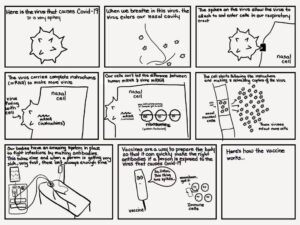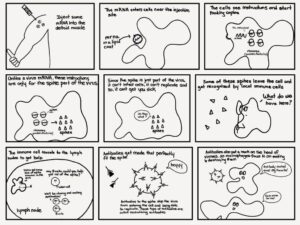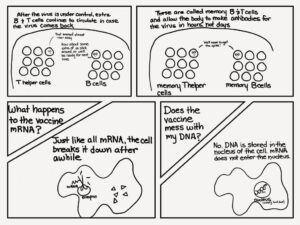by Katharine Bierce
The Buddha said he taught about suffering and the end of suffering. If there’s one thing (OK, or three things) we’ve all learned from the coronavirus pandemic, it is the truth of suffering, interconnectedness, and impermanence.
I am a yoga teacher, a Reiki practitioner, and an enthusiast of qigong, acupuncture, and “alternative” healing methods. And, I get my yearly flu shot, and am getting the COVID-19 vaccine and I encourage everyone to do so. Here’s why.
When you have a chance to reduce suffering, do it
As Patanjali’s Yoga Sutra I.33 says:
Maitri Karuna Muditopeksanam Sukha Duhka Punyapunya Visayanam Bhavantas Citta Prasadanam.
This mentions the four divine abodes of the heart, the Brahma Viharas, or compassion, loving-kindness, appreciative joy, and equanimity.
One of my favorite translations of this sutra comes from T.K.V. Desikachar, who studied with the grandfather of modern yoga, Krishnamacharya. Desikachar explains thus in his book The Heart of Yoga:
“In daily life we see people who are happier than we are, people who are less happy. Some may be doing praiseworthy things and others causing problems. Whatever may be our usual attitude toward such people and their actions, if we can be pleased with others who are happier than ourselves, compassionate towards those who are unhappy, joyful with those doing praiseworthy things, and remain undisturbed by the errors of others, our mind will be very tranquil.”
In this post, I want to focus on compassion. Cultivating compassion towards those who are suffering is thus an ancient yogic idea. But, compassion isn’t just a feeling – it’s a motivation for action to alleviate suffering. That distinguishes compassion from empathy, which is just feeling the feelings of others.
As you free yourself from suffering, you have more opportunities to help others
One of the best motivations to practice meditation, yoga, or any spiritual discipline is to be of service to others. Why? Because even if you have a million dollar condo in a nice neighborhood, if there are still homeless people around who are suffering, you share that suffering. As humans, we are social animals, and it is a natural response to want to help others who are suffering. If we close our minds and hearts to the suffering of others, we are shutting down what it means to be fully human. Spiritual practice gives us the technology to free our hearts and minds so we can get out of our own way, and more effectively be helpful in tough situations.
Science is methodical, like training the mind in meditation
The scientific method is one of the best ways we have to create new knowledge in a systematic way. A scientific experiment using the scientific method starts with a question. That question provokes some initial research into the area, and then the scientist formulates a hypothesis: something that can be falsified or supported by data. The scientist designs an experiment to gather data, then analyzes the data, reports the findings or conclusions (often in a published article that is reviewed by other scientists who try to find problems with it). The process continues iteratively – the end results of one experiment can be the beginning of an idea for another experiment.
In meditation, such as shamatha-vipassana practice, we systematically bring the mind back to an object (shamatha) to calm the mind, and then use the calmer, more collected, stabilized, unified mind as a way to look into the nature of our experience more closely (vipassana). The book The Mind Illuminated is one example of a meditation manual that outlines how to train the mind first by stabilizing it and then using that collected, unified mind to examine reality in a new way, like building and then using a microscope to look at small organisms.
What is a randomized controlled trial?
The vaccines against COVID-19 were tested in randomized, controlled trials, with tens of thousands of people, and shown to be effective in fighting this deadly disease. A randomized, controlled trial means that the experimenter randomly assigns people to get the vaccine or a placebo (a different flu vaccine or a different shot, or “control”) to compare if the real vaccine is effective, rather than someone just thinking they got the vaccine (the placebo). More people in the control group became sick with COVID-19. This number was large enough to show mathematically that the difference wasn’t a coincidence. The vaccine had prevented illness. There were also three trial phases to test safety, efficacy, and then a large-scale trial, followed by post-approval surveillance to see if any issues cropped up. If you want to nerd out on the details, here’s the New England Journal of Medicine published article on the Pfizer mRNA vaccine.
Doing science is hard work; it’s not about the money
In high school, I had the opportunity to work in a chemical engineering lab as an intern. I was at Tufts University for a summer, helping with research on gold and cerium oxide nanoparticles in the water-gas shift reaction. I won’t nerd out on the details here, but the basic area is related to the same kinds of things – catalysts – that turn toxic exhaust from your car’s tailpipe into less toxic stuff. Doing science was painstakingly slow, and could happen at odd hours. Some things had to happen at very precise times, and other things took a long time. The PhD student I worked with would frequently spend weekends in the lab. It can be hard to have a social life when one’s schedule is dictated by how long chemical reactions take and when the samples are ready for testing.
I also know at least one person who did science in a not-very-well-paying field. In their journey to become a PhD and then a full time scientist with a job, at one point they were on food stamps – they were paid that little. Scientists care about seva, or service, too, to help others. If you think science isn’t a spiritual practice, consider the sacrifices that scientists make to create breakthroughs that save lives. The main points here are: Scientists don’t do science for the money (compared to, say, investment banking), and a great deal of thought and effort goes into science – such as making vaccines.
When you find something that alleviates suffering, do it
Back to the Buddha. As you may know from the story of his life, he tried pretty much every technique that was available in ancient India to try to find awakening. He tried ascetic practices, fasting, abandoning his family to focus on his practice, all kinds of stuff, but none of it worked. When he found awakening, initially he was hesitant to teach because he thought no one would understand him. Thankfully, he ultimately taught the methods that worked for alleviating suffering for forty years after his awakening. Today, modern science is also demonstrating the benefits of meditation practice: remember that the Dalai Lama is a fan of science, and there are numerous studies putting monks or long-term meditators in MRI machines and seeing how their brains are different than non-meditators in many helpful ways.
The Buddha found liberation from suffering, and science can enable freedom from suffering, too. COVID-19 is a deadly virus that has killed nearly three million people globally as of this writing. Anything that can help reduce deaths and keep people out of the hospital is something to celebrate, even if it’s imperfect or has some side effects for a few hours or days.
Here’s a fun cartoon that explains how the COVID-19 vaccine works, simply, with some humor (click to enlarge):
cartoon by Emily Watters M.D. (shared here with permission)
For all these reasons, please: when you or your loved ones have the chance to get vaccinated against now-preventable diseases like polio, mumps, rubella, and now COVID-19, don’t wait – vaccinate!
 Katharine first learned about meditation at an event with free food during college in Chicago in 2009. After attending classes with Shambhala, she started an almost-daily practice in 2012 while working in consulting in New York City. Her influences include Nikki Mirghafori, Pema Chödrön, Vipassana in the style of S.N. Goenka, Tucker Peck, Culadasa, Jeremy Graves, The Mind Illuminated, Rev. angel Kyodo williams, somatic meditation with Neil McKinlay and Norman Elizondo, and the insight meditation teachers at Spirit Rock. In March 2020, she completed a month-long meditation retreat, which is her seventh retreat of a week or more. Katharine works full time in technology marketing at a Fortune 100 company in San Francisco and also teaches yoga on evenings and weekends with Business Casual Yoga.
Katharine first learned about meditation at an event with free food during college in Chicago in 2009. After attending classes with Shambhala, she started an almost-daily practice in 2012 while working in consulting in New York City. Her influences include Nikki Mirghafori, Pema Chödrön, Vipassana in the style of S.N. Goenka, Tucker Peck, Culadasa, Jeremy Graves, The Mind Illuminated, Rev. angel Kyodo williams, somatic meditation with Neil McKinlay and Norman Elizondo, and the insight meditation teachers at Spirit Rock. In March 2020, she completed a month-long meditation retreat, which is her seventh retreat of a week or more. Katharine works full time in technology marketing at a Fortune 100 company in San Francisco and also teaches yoga on evenings and weekends with Business Casual Yoga.




